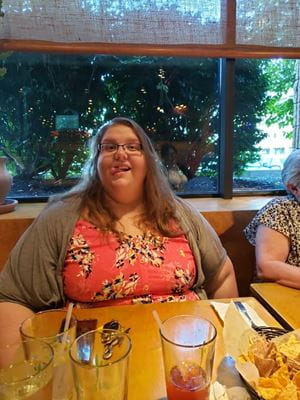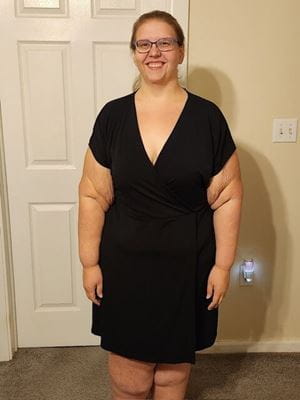According to 31-year-old Pittsburgh resident, Amanda Thomas, she has struggled with her weight for as long as she can remember. So while she says it was a “long time coming,” her “a-ha moment” came in August 2021 when she had gone to her primary care provider (PCP) for an annual physical.
“In the years leading up [to that doctor visit], I had gradually been gaining weight. But at that appointment I was about to tip the scale at 500 pounds. I was borderline diabetic, I struggled with hypertension, and I had a lot of mobility loss,” said Amanda.
She had even herniated three discs in her back due to her gait and how she would brace her weight. The herniated discs resulted in sciatica and the inability for her to stand up straight or move without being in extreme pain. She had surgery to repair the discs, only to herniate them again.
Amanda had “tried it all” in terms of trying to lose weight on her own – different diets, weight loss pills, nutritionists – but never had any success.
“For me, it was always one of those things where it works until you stop. Or some of the pills had dangerous side effects like high blood pressure. It wasn’t sustainable.”
Amanda’s PCP had recommended bariatric surgery to her before, but that day in 2021, she was finally ready to talk about it and start her journey. Her doctor recommended her to Anita Courcoulas, MD, MPH, FACS, and her team at UPMC Magee-Womens Hospital for next steps.
“Born again”
Amanda saw Dr. Courcoulas and her team within a few weeks, at which point she decided – in consultation with Dr. Courcoulas and her PCP – that gastric sleeve surgery would be the best fit for her.
 Gastric sleeve surgery is a procedure in which a bariatric surgeon removes part of the stomach and creates a new, tube-shaped stomach or "sleeve". By reducing the size of the stomach, the amount of food the patient can eat at one time is limited, helping them feel full sooner. In most cases, this surgery is performed laparoscopically, making several small 1/4- to 1/2-inch abdominal incisions.
Gastric sleeve surgery is a procedure in which a bariatric surgeon removes part of the stomach and creates a new, tube-shaped stomach or "sleeve". By reducing the size of the stomach, the amount of food the patient can eat at one time is limited, helping them feel full sooner. In most cases, this surgery is performed laparoscopically, making several small 1/4- to 1/2-inch abdominal incisions.
“At that point, though, Dr. Courcoulas recommended that I lose 50 pounds to have the best chance of having my surgery with the laparoscopic, minimally invasive approach, which is safer,” said Amanda. “Six months later, I had lost those 50 pounds, passed my psych evaluation, and had been meeting with my nutritionist, Lisa, on a monthly basis, and with a [mental health] therapist on a weekly basis.”
In April 2022, just shy of Amanda’s 31st birthday, Dr. Courcoulas performed her weight loss surgery at UPMC Magee-Womens.
Amanda, who was actually born at Magee-Womens in the 90s, said: “I like to say I was born at Magee, and I was re-born at Magee when I had my surgery.”
Adjusting to a New Reality Post-Surgery
“Post-surgery, I continued to meet with my nutritionist and therapist on a monthly basis,” said Amanda. “I still meet with my nutritionist, just every three months instead of monthly. I continue to see her as a great resource. She always keeps me honest and has great ideas I can use. I can always go to her with the questions like, ‘Are these normal things that I’m feeling, tasting?’”
Amanda also started going to the gym to increase her physical fitness.
“And after surgery, your body is continually changing. Even though it’s for the better and extending my life dramatically, there are some body positivity issues that came along with it, [like] skin sagging. I didn’t do my weight loss surgery because of vanity, I did it for health issues, but even still, I have had body image issues for a long time. It was important to have a space where I would work through some of those things and really dig into things like ‘Was I binge eating? What was causing [the binge eating]? What were the emotions behind it all?’”
Amanda also took advantage of weekly group therapy for body positivity that her therapist connected her with. The group was a place where Amanda could further explore her evolving relationship with food and her body.
In addition to her medical and behavioral support system, Amanda says she relied on support from her family, friends, and from online support groups such as “The Sisterhood of the Traveling Pants: Weight Loss Edition” Facebook group where those who are on a weight loss journey can pass along their gently used clothing that no longer fits to someone else. The clothes are all free; the recipient just pays for the cost of shipping.
“For a while I had this mental state that I needed to hold on to my clothes because I ‘might need them someday.’ But when I realized that wasn’t the direction I was going and I was ready to let them go, I donated them all to a homeless shelter here in Pittsburgh. That felt really good,” said Amanda.
Amanda went on to reiterate how critical it is for anyone undergoing weight loss surgery to make sure they have a strong support system before starting their journey.
“Once you’re in [the journey], you’re going to need [the support system]. So whether it’s your family, friends, whatever your support system looks like, make sure you’re set up with coping skills and tools to help you be successful because it’s a long game. Sometimes the scale will go up. Sometimes you’ll stall for a month and half. During those times, it’s so important to stay in the right mental state and to rely on your resources and support system. That’s when you have to focus on the little victories that don’t involve the scale.”
Life Changing Is…Setting Small Goals That Equate to Big Change
Today, Amanda is a few pounds shy of clearing 200 pounds lost and she is still maintaining her healthy habits. She doesn’t have a huge, ideal weight goal that she is aiming for but is, instead, setting small goals for herself and working to achieve those. It’s a strategy that has proven successful for her thus far.
“For this process to work, it has to be a lifestyle change, not a spur of the moment occurrence,” she says. “It’s about healthy habits, healthy changes to your daily life. Those all add up. And for me, not setting those big goals, but setting the smaller goals and taking those small wins as wins has helped me stay on the right path. I said to myself, ‘I want to lose 50 pounds, then it was 70, then 140 – a whole person – then it was 175, now it’s 200 pounds. And after that, it will be 30 more.”
 When Amanda reaches her 200-pound benchmark, she says she is rewarding herself by booking a trip to Egypt.
When Amanda reaches her 200-pound benchmark, she says she is rewarding herself by booking a trip to Egypt.
“It’s somewhere I’ve always wanted to go, but never thought it would be in the realm of possibilities. But then again, I never thought losing 200 pounds would be in my realm of possibilities either!”
Amanda is quick to point out that throughout her journey thus far, “the scale hasn’t been the only judgment tool.”
“[The numbers on the scale] are not the only reason I’m doing this. They’re not the only accomplishment. It’s been life-changing that I can now do things. When I was 500 pounds, going out hurt, so I was a hermit. Now that I’ve lost weight, I get to decide what I enjoy in the world. I’m more active outside. I can go for hikes, go for bike rides. I saw a women’s karate class, and thought it sounded interesting, so I tried it and found out I really enjoy that. I’m not worried about weight requirements or having to buy a second seat on a plane. When I’m in the front seat of a car, someone can actually sit comfortably behind me now. It’s all of these little things. If I’m just looking at the scale, then some may say that I’ve failed. But that’s not the case.”
This patient’s treatment and results may not be representative of all similar cases.


















